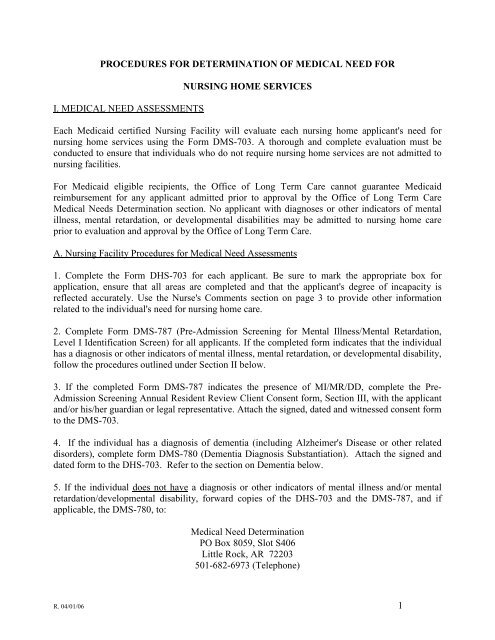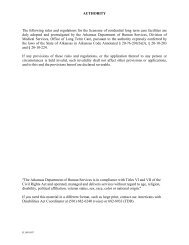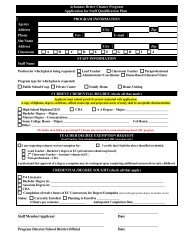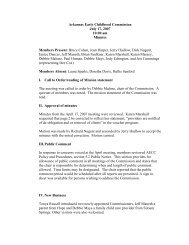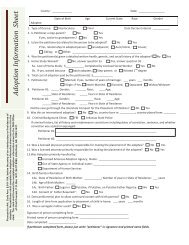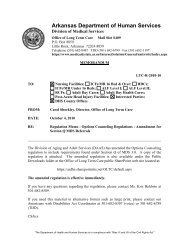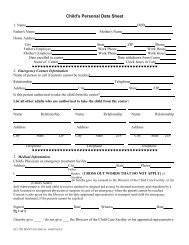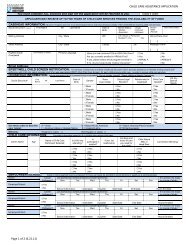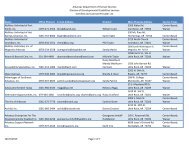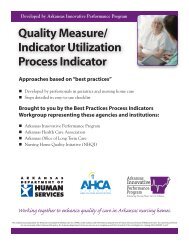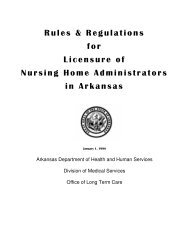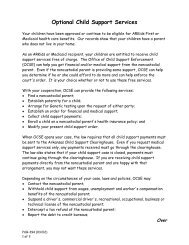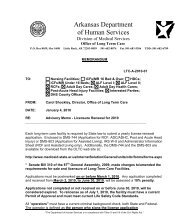Medical Need Determination Procedure - Arkansas Department of ...
Medical Need Determination Procedure - Arkansas Department of ...
Medical Need Determination Procedure - Arkansas Department of ...
Create successful ePaper yourself
Turn your PDF publications into a flip-book with our unique Google optimized e-Paper software.
PROCEDURES FOR DETERMINATION OF MEDICAL NEED FOR<br />
I. MEDICAL NEED ASSESSMENTS<br />
NURSING HOME SERVICES<br />
Each Medicaid certified Nursing Facility will evaluate each nursing home applicant's need for<br />
nursing home services using the Form DMS-703. A thorough and complete evaluation must be<br />
conducted to ensure that individuals who do not require nursing home services are not admitted to<br />
nursing facilities.<br />
For Medicaid eligible recipients, the Office <strong>of</strong> Long Term Care cannot guarantee Medicaid<br />
reimbursement for any applicant admitted prior to approval by the Office <strong>of</strong> Long Term Care<br />
<strong>Medical</strong> <strong>Need</strong>s <strong>Determination</strong> section. No applicant with diagnoses or other indicators <strong>of</strong> mental<br />
illness, mental retardation, or developmental disabilities may be admitted to nursing home care<br />
prior to evaluation and approval by the Office <strong>of</strong> Long Term Care.<br />
A. Nursing Facility <strong>Procedure</strong>s for <strong>Medical</strong> <strong>Need</strong> Assessments<br />
1. Complete the Form DHS-703 for each applicant. Be sure to mark the appropriate box for<br />
application, ensure that all areas are completed and that the applicant's degree <strong>of</strong> incapacity is<br />
reflected accurately. Use the Nurse's Comments section on page 3 to provide other information<br />
related to the individual's need for nursing home care.<br />
2. Complete Form DMS-787 (Pre-Admission Screening for Mental Illness/Mental Retardation,<br />
Level I Identification Screen) for all applicants. If the completed form indicates that the individual<br />
has a diagnosis or other indicators <strong>of</strong> mental illness, mental retardation, or developmental disability,<br />
follow the procedures outlined under Section II below.<br />
3. If the completed Form DMS-787 indicates the presence <strong>of</strong> MI/MR/DD, complete the Pre-<br />
Admission Screening Annual Resident Review Client Consent form, Section III, with the applicant<br />
and/or his/her guardian or legal representative. Attach the signed, dated and witnessed consent form<br />
to the DMS-703.<br />
4. If the individual has a diagnosis <strong>of</strong> dementia (including Alzheimer's Disease or other related<br />
disorders), complete form DMS-780 (Dementia Diagnosis Substantiation). Attach the signed and<br />
dated form to the DHS-703. Refer to the section on Dementia below.<br />
5. If the individual does not have a diagnosis or other indicators <strong>of</strong> mental illness and/or mental<br />
retardation/developmental disability, forward copies <strong>of</strong> the DHS-703 and the DMS-787, and if<br />
applicable, the DMS-780, to:<br />
<strong>Medical</strong> <strong>Need</strong> <strong>Determination</strong><br />
PO Box 8059, Slot S406<br />
Little Rock, AR 72203<br />
501-682-6973 (Telephone)<br />
R. 04/01/06 1
Keep a copy <strong>of</strong> all forms for the facility’s files.<br />
501-683-5306 (FAX)<br />
Whenever possible, the application packet should be submitted to OLTC prior to the individual's<br />
admission to the Nursing Facility. Otherwise, the packet must be submitted within 48 hours <strong>of</strong> the<br />
individual's admission to the facility.<br />
For private pay (Medicare, VA contract, private insurance, etc.) applicants who are applying for<br />
Medicaid coverage, the facility must submit the packet as soon as facility staff is made aware that<br />
the application will be made.<br />
6. If the individual does have a diagnosis or other indicators <strong>of</strong> mental illness and/or mental<br />
retardation/developmental disability follow procedures outlined in Section II.<br />
7. Send a copy <strong>of</strong> the EMS-702, Notice <strong>of</strong> Admission, Discharge, or Transfer from Nursing Home<br />
to the local County DHS <strong>of</strong>fice and to the <strong>Medical</strong> <strong>Need</strong> <strong>Determination</strong> Unit at the address in<br />
Section I(A)(5), above.<br />
8. Ensure that an individual acting on behalf <strong>of</strong> the applicant applies or has applied for nursing<br />
home care at the DHS County Office.<br />
B. OLTC <strong>Procedure</strong>s for <strong>Medical</strong> <strong>Need</strong> Assessments<br />
1. On receipt <strong>of</strong> a complete medical need assessment packet (Forms DHS-703, DMS-787, and if<br />
applicable the DMS-780, and any other necessary documentation), the information received will be<br />
reviewed by OLTC, and OLTC will make a determination as to the individual's need for nursing<br />
home placement.<br />
2. If OLTC determines that the individual meets medical criteria for nursing home placement, and<br />
recommends placement, OLTC will determine the level <strong>of</strong> care and a date to be reviewed when<br />
applicable. The Office <strong>of</strong> Long Term Care will then forward the determination (Form EMS-704) to<br />
the Nursing Facility and to the County DHS Office for completion <strong>of</strong> the financial eligibility and<br />
routing <strong>of</strong> applicable forms.<br />
3. If OLTC determines, based on the information submitted, that the individual does not meet<br />
medical criteria for nursing home placement, and recommends that placement be denied, OLTC<br />
will then notify the Nursing Facility and the DHS County Office. Once the Nursing Facility is<br />
notified <strong>of</strong> the denial, the facility may send any additional information/comments that might impact<br />
OLTC’s decision and recommendation. Any additional comments sent in for reconsideration must<br />
be received by OLTC within 10 days <strong>of</strong> the date <strong>of</strong> the denial notice. Upon receipt <strong>of</strong> the<br />
information, OLTC will determine, based on the information submitted, whether the individual<br />
meets medical criteria for nursing home placement, and recommend whether placement be<br />
approved or denied. The Office <strong>of</strong> Long Term Care will then notify the Nursing Facility, and will<br />
notify the DHS County Office only if the determination changes as a result <strong>of</strong> the reconsideration.<br />
R. 04/01/06 2
a. If additional information is received and results in approval for NF placement,<br />
notification will be sent to the Nursing Facility.<br />
b. If additional information is not received or is not sufficient to indicate a medical<br />
necessity for nursing home placement, the local DHS County Office and the Nursing<br />
Facility will be notified <strong>of</strong> the denial on the EMS-704.<br />
<strong>Determination</strong>s that individual applicants do not meet medical criteria for nursing home placement<br />
are subject to the Appeals and Fair Hearings process. Appropriate forms and information<br />
regarding appeal timeframes may be obtained from the local County DHS Office.<br />
II.<br />
PRE-ADMISSION SCREENING FOR MENTAL ILLNESS AND/OR MENTAL<br />
RETARDATION/DEVELOPMENTAL DISABILITY<br />
Under current Federal regulations, all nursing home applicants, including private pay applicants,<br />
must be screened for diagnoses or other indicators <strong>of</strong> mental illness and/or mental<br />
retardation/developmental disability (MI/MR/DD) prior to admission to a Medicaid certified<br />
Nursing Facility.<br />
Applicants whose initial screening (Level I) indicates the presence <strong>of</strong> MI/MR/DD must be referred<br />
to Level II for a full psychosocial evaluation to determine whether or not they need specialized<br />
services for the MI/MR/DD and whether or not a nursing facility is the most appropriate placement<br />
for them. The State has seven (7) to nine (9) workdays from the time the MI/MR/DD is identified<br />
under the initial screening to complete the Level II assessment. It is imperative that these packets<br />
be immediately forwarded to OLTC PASRR since conducting the Level II assessment requires:<br />
1. That a qualified evaluator be located;<br />
2. That the information regarding the applicant be forwarded;<br />
3. That an appointment for the assessment be made with the individual, the hospital staff, or<br />
both;<br />
4. That the assessment be conducted;<br />
5. That the completed assessment be returned to the contractor;<br />
6. That the completed assessment be sent for psychiatric review and sign <strong>of</strong>f; and,<br />
7. That the completed assessment be sent to the Division <strong>of</strong> Developmental Disabilities<br />
Services or the Division <strong>of</strong> Mental Health Services.<br />
The Office <strong>of</strong> Long Term Care has a contract with Bock Associates, Inc. to conduct the Level II<br />
assessments at State expense and Bock handles all arrangements for the Level II.<br />
R. 04/01/06 3
Under current Federal regulations, failure to conduct the full Pre-Admission Screening <strong>of</strong> persons<br />
identified as potentially MI or MR (Level I and Level II) prior to the applicant's admission to the<br />
Nursing Facility will result in denial <strong>of</strong> Medicaid coverage until the PASRR determination date is<br />
established. The Nursing Facility may not bill the resident or the resident’s family for services<br />
received by the resident during this denial time period.<br />
A. Nursing Facility <strong>Procedure</strong>s for Pre-Admission Screening for Mental Illness and/or Mental<br />
Retardation<br />
1. Complete the Form DMS-787 for all applicants (including private pay) to the Nursing Facility.<br />
This is the Level I Identification phase <strong>of</strong> the Pre-Admission Screening.<br />
2. Determine whether there is a diagnosis or other indication <strong>of</strong> MI/MR/DD. Any "Yes" answer on<br />
the Mental Retardation/Developmental Disabilities or Mental Illness sections <strong>of</strong> the DMS-787<br />
requires referral to Level II.<br />
3. If there is no indication <strong>of</strong> MI/MR/DD, then forward the Forms DMS-787 and DHS-703, and<br />
Form DMS-780 if applicable, to the <strong>Medical</strong> <strong>Need</strong>s <strong>Determination</strong> Unit <strong>of</strong> the Office <strong>of</strong> Long Term<br />
Care, as specified in Section I(A)(5) <strong>of</strong> these regulations for Medicaid applicants.<br />
For private pay applicants, file the DMS-787 with the applicant's other facility records.<br />
4. If the completed Form DMS-787 indicates the presence <strong>of</strong> MI/MR/DD (any "Yes" answer in the<br />
MR/DD or MI sections), the Forms DMS-787, DHS-703, and DMS-780 if applicable, and any<br />
other necessary documentation must be forwarded to Bock Associates. The forms should be<br />
FAXED to:<br />
Bock Associates<br />
FAX Number (501) 374-2541<br />
Telephone Number (501) 374-2559<br />
The facility should keep a copy <strong>of</strong> the packet in the applicant's file.<br />
5. When there is an indication <strong>of</strong> mental illness and/or mental retardation DO NOT ADMIT THE<br />
APPLICANT. If there is evidence that the individual would be in danger if not immediately<br />
admitted to the nursing facility, facility staff may contact the <strong>Medical</strong> <strong>Need</strong> <strong>Determination</strong> Unit at<br />
682-8481 to discuss the situation.<br />
B. OLTC-PASRR <strong>Procedure</strong>s for Pre-Admission Screening for Mental Illness and/or Mental<br />
Retardation<br />
1. On receipt <strong>of</strong> a complete assessment packet (Forms DHS-703, DMS-787, and form DMS-780 if<br />
applicable) OLTC-PASRR will refer the individual to Bock Associates, Inc., for psychosocial<br />
assessment.<br />
R. 04/01/06 4
2. A copy <strong>of</strong> the packet will be forwarded to the <strong>Medical</strong> <strong>Need</strong>s <strong>Determination</strong> section so that the<br />
medical need assessment may occur simultaneously with the PASRR assessment.<br />
3. As soon as the final determinations have been made by the Divisions <strong>of</strong> Mental Health Services<br />
or Developmental Disabilities Services, the appropriate agencies and individuals (applicant,<br />
guardian, nursing facility, hospital discharge planner) will be notified <strong>of</strong> the placement and special<br />
services decisions by mail. A copy <strong>of</strong> the complete assessment and a written notification will be<br />
sent to the nursing facility and to the family, responsible party, or legal guardian.<br />
PASRR placement and special services determinations are subject to the Appeals and Fair Hearings<br />
process. Appropriate forms and information regarding appeal timeframes may be obtained from<br />
the local County DHS Office.<br />
III. OTHER PROCEDURES/GUIDELINES<br />
Prior Authorization for Out-<strong>of</strong>-State Applicants<br />
Applicants or transfers from other states, including border areas, must receive authorization from<br />
the Office <strong>of</strong> Long Term Care - <strong>Medical</strong> <strong>Need</strong>s <strong>Determination</strong> section prior to admission to an<br />
<strong>Arkansas</strong> Nursing Facility. To request clearance on out-<strong>of</strong>-state applicants, contact:<br />
<strong>Medical</strong> <strong>Need</strong>s <strong>Determination</strong> Unit<br />
501-682-8481<br />
To expedite this process, please obtain as much information as possible about the applicant prior to<br />
contacting <strong>Medical</strong> <strong>Need</strong>s <strong>Determination</strong> section. This information should include: presenting<br />
diagnoses (including whether or not the individual is diagnosed or has indicators <strong>of</strong> mental illness<br />
and/or mental retardation/developmental disability), medications, locations <strong>of</strong> <strong>Arkansas</strong> relatives,<br />
level <strong>of</strong> ADLs, dementia, level <strong>of</strong> mental competence, etc.<br />
Private Pay Applicants<br />
All private pay (Medicare, VA contract, private insurance, etc.) applicants must be screened for<br />
mental illness and/or mental retardation/developmental disability (MI/MR/DD) prior to admission<br />
to the nursing facility. A copy <strong>of</strong> the DMS-787 will be completed for each private pay applicant<br />
prior to admission.<br />
• If the completed DMS-787 does not indicate that the individual has a diagnosis or<br />
other indicators <strong>of</strong> mental illness, the form should be filed in the individual's facility<br />
records for easy access.<br />
• If the completed form indicates that the individual has a diagnosis or other indicators<br />
<strong>of</strong> MI/MR/DD, he or she must meet the same medical necessity criteria for<br />
admission that Medicaid applicants/recipients must meet. In these cases follow<br />
procedures outlined in Section II.<br />
R. 04/01/06 5
Dementia<br />
Persons with a diagnosis <strong>of</strong> Dementia (including Alzheimer's Disease or other related disorders)<br />
that is based on the criteria <strong>of</strong> the Diagnostic and Statistical Manual for Mental Disorders, 3rd Ed.<br />
(DSM-IV-R) are excluded from the definition <strong>of</strong> mental illness for purposes <strong>of</strong> the Pre-Admission<br />
Screening if the dementia is the applicant's only mental illness/mental retardation diagnosis. These<br />
admissions can, therefore, be expedited if written verification is provided by the physician making<br />
the diagnosis. This verification may consist <strong>of</strong> the physician's dated signature on the Dementia<br />
Diagnosis Substantiation form DMS-780. The other written verification must include the diagnosis,<br />
must state that the diagnosis was based on the criteria in the DSM-IV-R and must be signed and<br />
dated by the physician.<br />
Placement <strong>of</strong> Hospitalized Patients<br />
Hospital Discharge Planners should make referrals <strong>of</strong> hospitalized patients to the Nursing Facility<br />
as soon as it is anticipated that placement in a Medicaid-certified nursing facility is likely.<br />
Hospital Discharge Planners may coordinate with Nursing Facilities by assisting in completion <strong>of</strong><br />
the DHS-703, DMS-787, and form DMS-780 if applicable, and in providing needed information,<br />
such as a comprehensive transfer sheet listing medications, treatments, laboratory and x-ray, where<br />
appropriate, as well as functional abilities. Hospital Discharge Planners assisting with nursing<br />
home medical necessity activities will follow the same procedures specified for nursing facilities.<br />
Forms Distribution<br />
Nursing Facilities and hospitals can download the applicable forms from the OLTC web site at<br />
http://www.medicaid.state.ar.us/general/units/oltc.<br />
IV. MEDICAL CRITERIA<br />
a. To be determined a functionally disabled elderly individual, the individual must<br />
meet at least one <strong>of</strong> the following three criteria as determined by a licensed medical<br />
pr<strong>of</strong>essional:<br />
1. The individual is unable to perform either <strong>of</strong> the following:<br />
A. At least one (1) <strong>of</strong> the three (3) activities <strong>of</strong> daily living (ADLs) <strong>of</strong><br />
transferring/locomotion, eating or toileting without extensive<br />
assistance from or total dependence upon another person; or,<br />
B. At least two (2) <strong>of</strong> the three (3) activities <strong>of</strong> daily living (ADLs) <strong>of</strong><br />
transferring/locomotion, eating or toileting without limited assistance<br />
from another person; or,<br />
2. The individual has a primary or secondary diagnosis <strong>of</strong> Alzheimer's disease<br />
or related dementia and is cognitively impaired so as to require substantial<br />
supervision from another individual because he or she engages in<br />
R. 04/01/06 6
inappropriate behaviors which pose serious health or safety hazards to<br />
himself or others; or,<br />
3. The individual has a diagnosed medical condition which requires monitoring<br />
or assessment at least once a day by a licensed medical pr<strong>of</strong>essional and the<br />
condition, if untreated, would be life-threatening.<br />
4. No individual who is otherwise eligible for waiver services shall have his or<br />
her eligibility denied or terminated solely as the result <strong>of</strong> a disqualifying<br />
episodic medical condition or disqualifying episodic change <strong>of</strong> medical<br />
condition which is temporary and expected to last no more than twenty-one<br />
(21) days. However, that individual shall not receive waiver services or<br />
benefits when subject to a condition or change <strong>of</strong> condition which would<br />
render the individual ineligible if expected to last more than twenty-one (21)<br />
days.<br />
b. When determining eligibility for waiver services, if an individual requires a skilled<br />
level <strong>of</strong> care as defined below, eligibility for Medicaid will be denied. Likewise, if<br />
an individual has a serious mental illness, except as specified in Section IV (2)<br />
above, or has mental retardation, the individual will not be eligible for Medicaid<br />
unless the individual has medical needs unrelated to the diagnosis <strong>of</strong> serious mental<br />
illness or mental retardation and meets the criteria set out in Section IV(3) above,<br />
provided, however, that a diagnosis <strong>of</strong> severe mental illness or mental retardation<br />
will not bar eligibility for individuals having medical needs unrelated to the<br />
diagnosis <strong>of</strong> serious mental illness or mental retardation and meeting the criteria set<br />
out in Section IV(3) above.<br />
c. Definitions<br />
1. EATING means the intake <strong>of</strong> nourishment and fluid, excluding tube feeding<br />
and total parenteral (outside the intestines) nutrition. This definition does not<br />
include meal preparation.<br />
2. EXTENSIVE ASSISTANCE means that the individual would not be able to<br />
perform or complete the activity <strong>of</strong> daily living (ADL) without another<br />
person to aid in performing the complete task, by providing weight-bearing<br />
assistance.<br />
3. LICENSED MEDICAL PROFESSIONAL means a licensed nurse,<br />
physician, physical therapist, or occupational therapist.<br />
4. LIMITED ASSISTANCE means that the individual would not be able to<br />
perform or complete the activity <strong>of</strong> daily living (ADL) three or more times<br />
per week without another person to aid in performing the complete task by<br />
guiding or maneuvering the limbs <strong>of</strong> the individual or by other non-weight<br />
bearing assistance.<br />
5. LOCOMOTION means the act <strong>of</strong> moving from one location to another,<br />
regardless <strong>of</strong> whether the movement is accomplished with aids or devices.<br />
R. 04/01/06 7
6. MENTAL RETARDATION means a level <strong>of</strong> retardation as described in the<br />
American Association on Mental Retardation's Manual on Classification on<br />
Mental Retardation. For further clarification, see 42 C.F.R. § 483.100 - 102,<br />
Subpart C - Preadmission Screening and Annual Review <strong>of</strong> Mentally Ill and<br />
Mentally Retarded Individuals.<br />
7. SERIOUS MENTAL ILLNESS OR DISORDER means schizophrenia,<br />
mood, paranoid, panic or other severe anxiety disorder; somat<strong>of</strong>orm<br />
disorder; personality disorder; or other psychotic disorder. For further<br />
clarification, see 42 C.F.R. § 483.100 - 102, Subpart C - Preadmission<br />
Screening and Annual Review <strong>of</strong> Mentally Ill and Mentally Retarded<br />
Individuals.<br />
8. SKILLED LEVEL OF CARE means the following services when delivered<br />
by licensed medical personnel in accordance with a medical care plan<br />
requiring a continuing assessment <strong>of</strong> needs and monitoring <strong>of</strong> response to<br />
plan <strong>of</strong> care; and such services are required on a 24-hour/day basis. The<br />
services must be reasonable and necessary to the treatment <strong>of</strong> the individual's<br />
illness or injury, i.e., be consistent with the nature and severity <strong>of</strong> the<br />
individual's illness or injury, the individual's particular medical needs,<br />
accepted standards <strong>of</strong> medical practice, and in terms <strong>of</strong> duration and amount.<br />
• Intermuscular or subcutaneous injections if the use <strong>of</strong> licensed<br />
medical personnel is necessary to teach an individual or the<br />
individual's caregiver the procedure.<br />
• Intravenous injections and hypodermoclysis or intravenous feedings.<br />
• Levin tubes and nasogastric tubes.<br />
• Nasopharyngeal and tracheostomy aspiration.<br />
• Application <strong>of</strong> dressings involving prescription medication and<br />
aseptic techniques.<br />
• Treatment <strong>of</strong> Stage III or Stage IV decubitus ulcers or other<br />
widespread skin disorders that are in Stage III or Stage IV.<br />
• Heat treatments which have been specifically ordered by a physician<br />
as a part <strong>of</strong> active treatment and which require observation by nurses<br />
to adequately evaluate the individual's progress.<br />
• Initial phases <strong>of</strong> a regimen involving administration <strong>of</strong> medical gases.<br />
• Rehabilitation procedures, including the related teaching and adaptive<br />
aspects <strong>of</strong> nursing/therapies, that are part <strong>of</strong> active treatment, to<br />
obtain a specific goal and not as maintenance <strong>of</strong> existing function.<br />
• Ventilator care and maintenance.<br />
R. 04/01/06 8
• The insertion, removal and maintenance <strong>of</strong> gastrostomy feeding<br />
tubes.<br />
9. SUBSTANTIAL SUPERVISION means the prompting, reminding or<br />
guidance <strong>of</strong> another person to perform the task.<br />
10. TOILETING means the act <strong>of</strong> voiding <strong>of</strong> the individual's bowels or bladder,<br />
and includes the use <strong>of</strong> a toilet, commode, bedpan or urinal, transfers on and<br />
<strong>of</strong>f a toilet, commode, bedpan or urinal, the cleansing <strong>of</strong> the individual after<br />
the act, changes <strong>of</strong> incontinence devices such as pads or diapers,<br />
management <strong>of</strong> ostomy or catheters and adjustment to clothing.<br />
11. TOTAL DEPENDENCE means the individual needs another person to<br />
completely and totally perform the task for the individual.<br />
12. TRANSFERRING means the act <strong>of</strong> an individual in moving from one<br />
surface to another, and includes transfers to and from bed, wheelchairs,<br />
walkers and other locomotive aids, and chairs.<br />
R. 04/01/06 9
Intermediate I-S<br />
Services when delivered by licensed<br />
medical personnel in accordance with a<br />
plan <strong>of</strong> care requiring continuing<br />
assessment and monitoring on a daily<br />
basis and expected to last more than<br />
twenty-one (21) days. These<br />
services are:<br />
‣ Intrarmuscular or subcutaneous<br />
injections if the use <strong>of</strong> licensed<br />
medical pr<strong>of</strong>essional personnel are<br />
necessary to teach an individual or<br />
the individual’s caregiver the<br />
procedure.<br />
‣ Intravenous injections and<br />
hypodermoclysis or intravenous<br />
feedings.<br />
‣ Levin tubes and nasogastric tubes<br />
‣ Nasopharyngeal and tracheostomy<br />
aspiration.<br />
‣ Application <strong>of</strong> dressings involving<br />
prescription medication and aseptic<br />
techniques.<br />
‣ Treatment <strong>of</strong> Stage III or Stage IV<br />
decubitus ulcers or other widespread<br />
skin disorders which are in Stage III<br />
or Stage IV.<br />
‣ Heat treatments which have been<br />
specifically ordered by a physician<br />
as a part <strong>of</strong> active treatment and<br />
which require observation by nurses<br />
to adequately evaluate the<br />
individual’s progress.<br />
‣ Initial phases <strong>of</strong> a regimen involving<br />
administration <strong>of</strong> medical gases.<br />
‣ Rehabilitation procedures, including<br />
the related teaching and adaptive<br />
aspects <strong>of</strong> nursing/therapies, that are<br />
part <strong>of</strong> active treatment, to obtain a<br />
specific goal and not as maintenance<br />
<strong>of</strong> existing function<br />
‣ Ventilator care and maintenance.<br />
‣ The insertion, removal and<br />
maintenance <strong>of</strong> gastrostomy feeding<br />
tubes.<br />
Degree or Incapacity Criteria for Admission <strong>of</strong> Residents into Nursing Homes<br />
(Not an Inclusive List)<br />
Intermediate I-A<br />
Must require total dependence or extensive<br />
assistance from another person in all three areas<br />
<strong>of</strong>:<br />
Mobility:<br />
Feeding:<br />
Toileting:<br />
‣ ADL Maximum assistance<br />
‣ Transferring to or from bed or<br />
chair with weight bearing<br />
assistance from another<br />
person.<br />
‣ Must be lifted to or from bed<br />
or chair.<br />
‣ Weight bearing assist from<br />
another person to ambulate.<br />
‣ Wheelchair push.<br />
‣ Requires turning in bed by<br />
another person.<br />
‣ Spoon fed.<br />
‣ Transferring on or <strong>of</strong>f<br />
commode or bedpan with<br />
weight bearing assistance from<br />
another person<br />
‣ Dependent upon another<br />
person for cleansing after the<br />
act, changing diapers, pads, or<br />
clothing.<br />
‣ Management <strong>of</strong> ostomy,<br />
catheter, or colostomy.<br />
Intermediate II-B<br />
Must require total dependence or extensive<br />
assistance from another person in two <strong>of</strong> the<br />
following areas:<br />
Mobility<br />
Feeding<br />
Toileting<br />
‣ ADL Moderate assistance<br />
‣ Transferring to or from bed or<br />
chair with weight bearing<br />
assistance from another person.<br />
‣ Must be lifted to or from bed or<br />
chair.<br />
‣ Weight bearing assist from<br />
another person to ambulate.<br />
‣ Wheelchair push.<br />
‣ Requires turning in bed by<br />
another person.<br />
‣ Spoon fed.<br />
‣ Transferring on or <strong>of</strong>f commode<br />
or bedpan with weight bearing<br />
assistance from another person.<br />
‣ Dependent upon another person<br />
for cleansing after the act,<br />
changing diapers, pads, or<br />
clothing.<br />
‣ Management <strong>of</strong> ostomy,<br />
catheter, or colostomy.<br />
Intermediate III-C<br />
Must require total dependence or extensive assistance in<br />
one area or limited assistance in two areas or have a<br />
diagnosis <strong>of</strong> Alzheimer’s or related dementia and require<br />
substantial supervision from another person:<br />
Mobility<br />
Feeding<br />
Toileting<br />
‣ ADL Minimum assistance three or more<br />
times per week.<br />
‣ Emphasis on supervision, protection, and<br />
assistance if has diagnosis <strong>of</strong> Alzheimer’s<br />
or related dementia.<br />
‣ Has a diagnosed medical condition that<br />
requires monitoring or assessment on a<br />
daily basis by a licensed medical<br />
pr<strong>of</strong>essional and the condition, if<br />
untreated, would be life threatening.<br />
‣ Limited assistance from another person for<br />
transferring to or from bed or chair and/or<br />
with ambulation.<br />
‣ Supervision due to wandering if has<br />
dementia diagnosis.<br />
‣ Supervision, cueing, encouragement due<br />
to dementia.<br />
‣ Assistance from another person to guide<br />
utensil to mouth due to blindness or<br />
tremors.<br />
‣ Reminding or assisted to bathroom prn.<br />
‣ Limited assistance to get on or <strong>of</strong>f<br />
commode.<br />
‣ Assistance with adjusting clothing.<br />
‣ Assistance with changing pads or diapers.<br />
‣ Assistance with cleansing after the act<br />
R. 04/01/06 10


